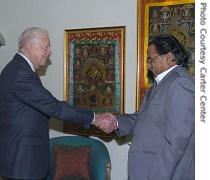2007年VOA标准英语-Former President Carter Suggests US Government(在线收听)
Kathmandu
16 June 2007
Former President Jimmy Carter, 82, says Washington should stop treating Nepal's Maoists as terrorists, and start talking with the former rebels instead. Mr. Carter is wrapping up a four-day visit to Nepal to assess the ongoing peace process and help organize upcoming national elections. Liam Cochrane reports from Kathmandu.
 |
| Former US President Jimmy Carter (L) shakes hands with Prachanda, leader of Nepal's Maoists during a meeting in Kathmandu, 15 June 2007 |
The Maoists abandoned their 10-year-long rebellion and joined an interim government this year. But because they are still considered terrorists by the U.S. government, American diplomats and aid workers are not allowed to meet them.
But after meeting Maoist leaders Prachanda and Babarum Battarai, the 2002 winner of the Nobel Peace Prize Jimmy Carter said Washington should consider removing the terrorist label.
"My own opinion is that the United States should establish some communication with the Maoists, because it's obvious the people of Nepal now have accepted the Maoists as playing a role in shaping the future of this country," he said.
He says that when he met Prachanda on Friday, he raised the issue of aggressive behavior by the Maoist's Young Communist League, and was reassured by the Maoist leader's personal promise to end the group's vigilantism.
The former president visited Nepal as head of the Carter Center, which has been involved in conflict resolution here. The center has 13 election observers traveling the country in the lead-up to constituent assembly elections due in November or December.
Mr. Carter says reports from his observers indicate that although the decade-long civil war is over, an unacceptable level of violence and fear remains.
"I think the almost universal concern is an absence of complete law and order in this country, a police force that is not performing well because perhaps they lack adequate political support, and this has led to some disturbing events throughout the country," he added.
But although he says the situation isn't perfect, he describes the achievements of the peace process as "extraordinary," and he called Prime Minister G.P. Koirala a "hero" for his role in the transition from civil war to peace.